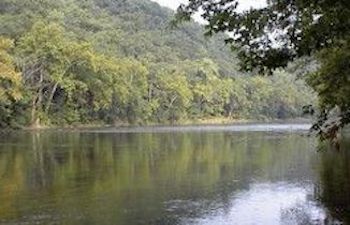
June 7, 1889 — The rainfall for April and May has been almost unprecedented in the history of this county. During the later month nearly three times as much rain has fallen as during the same period last year, and during the last three months the record exceeds that for the same time last year by 13.15 inches.
On last Thursday a storm of wind and rain struck the Page Valley. During the whole of Thursday night the wind blew almost like a hurricane, uprooting a great number of fruit and forest trees in the county, and prostrating wheat and grass. The rain meanwhile fell in torrents, ceasing for only a few moments at a time until about sunset on Friday evening.
Early Friday morning the streams gave unmistakeable signs of a great freshet, and by 11 o’clock a.m., the Hawksbill reached a height which it has rarely attained in the memory of the oldest inhabitant. During Friday night the Shenandoah River was swelling its torrents at the rate of about one foot per hour, and at 3 o’clock Saturday morning was within one foot of the high watermark of 1877.
Other streams in the county were swollen, and the loss in land, crops, fencing, etc., may be estimated by the tens of thousands of dollars. Below we give such details as we have been able to gather of the destruction this county:
Longs’s Mill
The water came within 12 inches of the mark made by the flood of ‘77. But little if any damage was done to the property. The farmers in this section have suffered severely in loss of crops, fencing and washing off of soil.
Sandy Hook
No damage done to buildings, except to the dwelling on Mr. Jas. H. Culler’s, which was partially undermined and the porch swept away.
Massanutton
In this section, the wide and fertile bottoms were deeply submerged. The damage seems to be much less than on similar occasion in the past. Further down the river, Messrs. Reuben and Jacob Ruffner, Jacob Bowers and others have suffered severely, Mr. Bowers losing about 70 acres of corn.
Rileyville
The bottom lands are destructively washing, with scarcely a vestige of the crops growing upon them remaining.
Grove Hill/Newport
Observations made at these places show the rise to have been within 18 inches of that of 1877. The water was within a foot of the second story in Fultz’s Mill at Newport, and did considerable damage to his dam. W.C. Kite’s saw mill was upset, which was about all the damage done in this section for a stretch of several miles, except the general destruction of crops, fencing, and washing of the land.
Marksville/vicinity
The damage by the Hawksbill in this vicinity was doubtless as great as that done by the flood in any section of the county. The stream broke through above the pike, directing its course toward the Old School Baptist Church, and re- entering the old channel about Messrs. Kendall’s and Long’s, doing great damage to the fine lands intervening. Mrs. Long’s mill at Marksville is of course cut off completely from its motive power, though a large force are at work turning the creek in its old channel. Mr. G.L. Kite’s tanyard was flooded and the leather greatly damaged. Mr. M.V.B. Kite’s mill and other property was considerably injured. He had a force of 18 hands at work on Monday repairing damage.
S.V.R.R. Damage
The high water did great damage to the Shenandoah Valley Railroad, though not as much in proportion to its length as was done to almost all the other roads of the state. Trains were suspended from Friday till Sunday, and it was not till Tuesday noon that the mail from the northern reached Luray. The Shenandoah Valley Railroad was the first road in the state, we learn, to get its line open and trains running regularly after the flood.
~ From the public archives of the Page News and Courier
•••
TODAY IN HISTORY is a feature of PageValleyNews.com
~ Check the date of the story you just read!


Be the first to comment